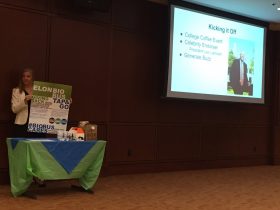Integrated Marketing Communications students presented proposed brand promotion campaigns for the Elon BioBus.

Kim reached out to Elon’s transportation department at the beginning of the semester after realizing there is a low awareness on campus about the BioBus, giving the students an opportunity to create a campaign to change that.
The students were split into six teams to create the BioBus campaigns. The class consisted of business majors and communications majors, allowing the teams to take a multi-disciplinary approach to the campaign. The client came to the class at the beginning of the semester to share information and goals. The students then proceeded with research including surveys and focus group interviews, a situation analysis, creative brief and marketing communication strategies.
Teams presented their proposals to a group of judges including Kim; Raghu Tadepalli, dean of the Martha and Spencer Love School of Business; Drew Hambright, transportation support technician; and Coleman Rich, senior lecturer in operations and supply chain management and chair of the department of marketing and entrepreneurship. Their presentations included an explanation of previous deliverables, an execution strategy, samples of how they would execute the media strategy and a final plan book, which was a written document for the client.
The winning team, Koury Communications, included seniors Elin Pipatti, Tyler Boule, Mercedes Riofrio, Ana Preciado and Aylin Sarmat. Their campaign had the overarching theme of #BioBusCares. With a two-pronged approach, the first part of the campaign was centered on first-year and sophomore students who wanted the convenience factor of the BioBus, and the second part of the campaign positioned the BioBus as a link to the greater Burlington community for junior and senior students. The proposed campaign included a kick-off event at College Coffee with President Leo M. Lambert’s endorsement, a social media aspect and a reward system for students who ride the BioBus.
“Creating the BioBus campaign for Professor Kim’s class allowed the students in our class to experience the entire campaign-creation process, beginning with thorough research and ending with the presentation to our client,” Pipatti said. “Personally, this was the first time I had been so intimately involved with every step of campaign creation. The project allowed me to develop preferences for which steps I enjoyed most, and as a result, I’ve been able to translate these discoveries into my career search.”
“When tasked with developing a new campaign for the BioBus, our team knew that we wanted to keep things simple,” Boule said. “We chose to focus in on and highlight the integral part the BioBus plays at Elon, and that is keeping the community connected.”
Hambright is currently reviewing the winning campaign with Elon’s transportation department to plan how some of the elements from the winning campaign can be implemented.
“The students did a really good job of being creative based off of the research they found and there was a lot of great insight in each of their campaigns,” Hambright said. “It helped open our eyes to new ideas out there. Based upon the great experience with the students’ projects and their great ideas, I foresee more interactions like this taking place in the future. The students are the No. 1 users of the BioBus, so their feedback is always important.”
“The students have become ambassadors for the program,” Kim said, “and I hope they will continue to drive this role on campus in the future.”


